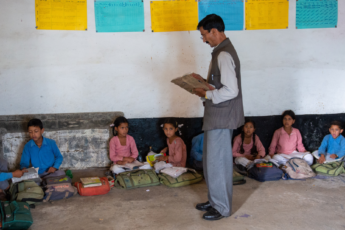Importance of Building Community Values in Children
In today’s world, we live in a highly competitive environment. Children are surrounded by different media, which may lead them to develop materialistic values often associated with the pursuit of money, fame and power. This can be detrimental to their development. To mitigate this, parents usually work hard to make their children feel safe and secure by creating a happy, healthy, and vibrant environment at home. But there is something that parents commonly miss: instilling community values in children.
Community values refer to a set of beliefs and behaviours that make society a better place for everyone. These include kindness, tolerance and empathy towards others, respect for human rights, equality of opportunity, peace, freedom, justice, truthfulness, honesty, sincerity, trustworthiness, integrity, and more.
The importance of building community values in children cannot be stressed enough. Connecting with the community helps children develop empathy and compassion towards others. They learn that everyone has different needs, abilities, skills, and experiences, and they should respect others and appreciate their differences. This helps them understand what it means to be part of a community, where each person contributes something unique to society.
Why is Community Involvement Important?
When children are involved in their community, they develop a sense of belonging and responsibility. They understand that their actions have consequences on other people’s lives as well as their own lives. They start learning to take responsibility for their actions instead of blaming others or other circumstances for anything that goes wrong in their lives or the world around them.
Children get an opportunity to learn new things about different cultures, traditions and beliefs by interacting with different people from different backgrounds. This helps them become more tolerant towards others and allows them to appreciate the values unique to each country or region. Children also learn how important it is to be part of a team or group. They learn cooperation, sharing and respect for one another’s ideas and opinions. They also learn how to compromise, negotiate and resolve conflicts peacefully without resorting to violence or aggression.
If you want your child to grow up into a well-rounded individual with good values and character who knows how to work with others, you must involve them in your community from an early age.
Community is not just about living in a house next door to someone on the same street or in the same building. It’s about interacting with people from different walks of life and learning from each other. Parents must start engaging their children at home by talking to them about the surrounding community — its people, culture, and traditions.
Family and Community Involvement in Early Childhood Education
As a parent, you are the first and most important influence on your child’s life. Your actions, words, and example all contribute to how your child grows into adulthood. Instilling community values into your children will help them feel confident in social situations and allow them to know what they should or shouldn’t do in certain situations. For example: if a child sees his father stealing from another person, he may think it’s okay because his father does it too, and he doesn’t know any better.
Parents must model good behaviour and encourage their kids to do the same. Here are some ways that parents can help their children learn about community values:
👉 Encourage them to volunteer at their local library or animal shelter. Volunteering is one of the best ways to teach children about giving back to their community. It also allows them to meet new people while helping others who might not have as much as they do.
👉 Talk about the news with your kids. It’s essential to keep current on what’s happening in the world and how it affects our community. When you read a story, discuss it with your children and ask them what they think. This is an opportunity to discuss how we should treat other people and why certain things are wrong. If you read an article that says someone did something terrible, talk about how they should have handled it differently or why they shouldn’t have done it in the first place.
👉 Use language that reflects the values of our community. When you’re talking with your children, use words like “kindness” and “respect” instead of “good” or “bad.” If someone does something good, tell your child why it was good — not just because it was nice or helpful, but because it reflected kindness and respect for others.
👉 Talk about recycling and why it’s essential to keep our planet clean. You could also talk about ways to recycle at home — for example, by separating your recyclables from your trash or composting food scraps.
👉 Help your child understand their own feelings and emotions better to control their actions and reactions in any given situation. For example, if your child is angry, help them learn how to express it appropriately instead of shouting or hitting others when mad (like other children might do).
👉 Let your child know what is expected of them. This includes letting your child know what behaviour is acceptable and what behaviour is not acceptable. Also, let your child know that they should do what is right even if no one else is watching or if no one else knows about it.
Benefits of Community Involvement in Schools
Community involvement in schools creates a sense of ownership for students, parents, and teachers. When people feel like they have a stake in something, they tend to care more about it. This is especially true in schools where students are often very attached to a particular school or principal because they may have gone there since kindergarten or had an influential teacher who greatly impacted their lives.
Many students feel disconnected from their school because they don’t see how they fit into its plans or goals. When teachers involve the community in their lessons, however, students can see exactly how they fit into the school’s mission of education and may feel more motivated. This sense of connection between students and school helps create a sense of belonging that makes students feel more invested in their education and learning environment.
Research has shown that when students are involved in activities outside of school, they are more likely to be engaged in the classroom. They have more resources for learning and can bring their knowledge and experience into the classroom. For example, students who participate in service-learning often report that they are better able to understand issues related to sustainability because they have seen first-hand how their actions affect the environment.
Service-learning also helps communities by providing students with opportunities to give back and make a difference. In addition, student groups working outside of school may develop lasting friendships that make it easier for them to work together as a team both inside and outside of school. Exposure to other cultures through community involvement can also help students become more culturally aware and sensitive, promoting understanding among people from different backgrounds.
It provides opportunities for young people to practice leadership skills. As part of community involvement programs, students may be asked to take on leadership roles, such as helping plan events or serving as student representatives on committees that oversee school activities. These roles give young people valuable experience in decision-making and teamwork before they graduate high school and enter the workforce or college.
Community involvement gives students insight into careers they might not have considered before. For example, suppose your school has an environmental club that works with local groups to restore wetlands or clean up beaches. In that case, some students may realize that ecological science is an exciting career path for them! The possibilities are endless, and only limited by your imagination. So put on your thinking cap, and start coming up with new ideas to involve students in the community.
Square Panda India’s programs are created to have a holistic impact, including developing the community and engaging all stakeholders, such as parents, teachers, and children, in its upliftment. To know more, visit ecce.squarepanda.in.




Leave a Comment